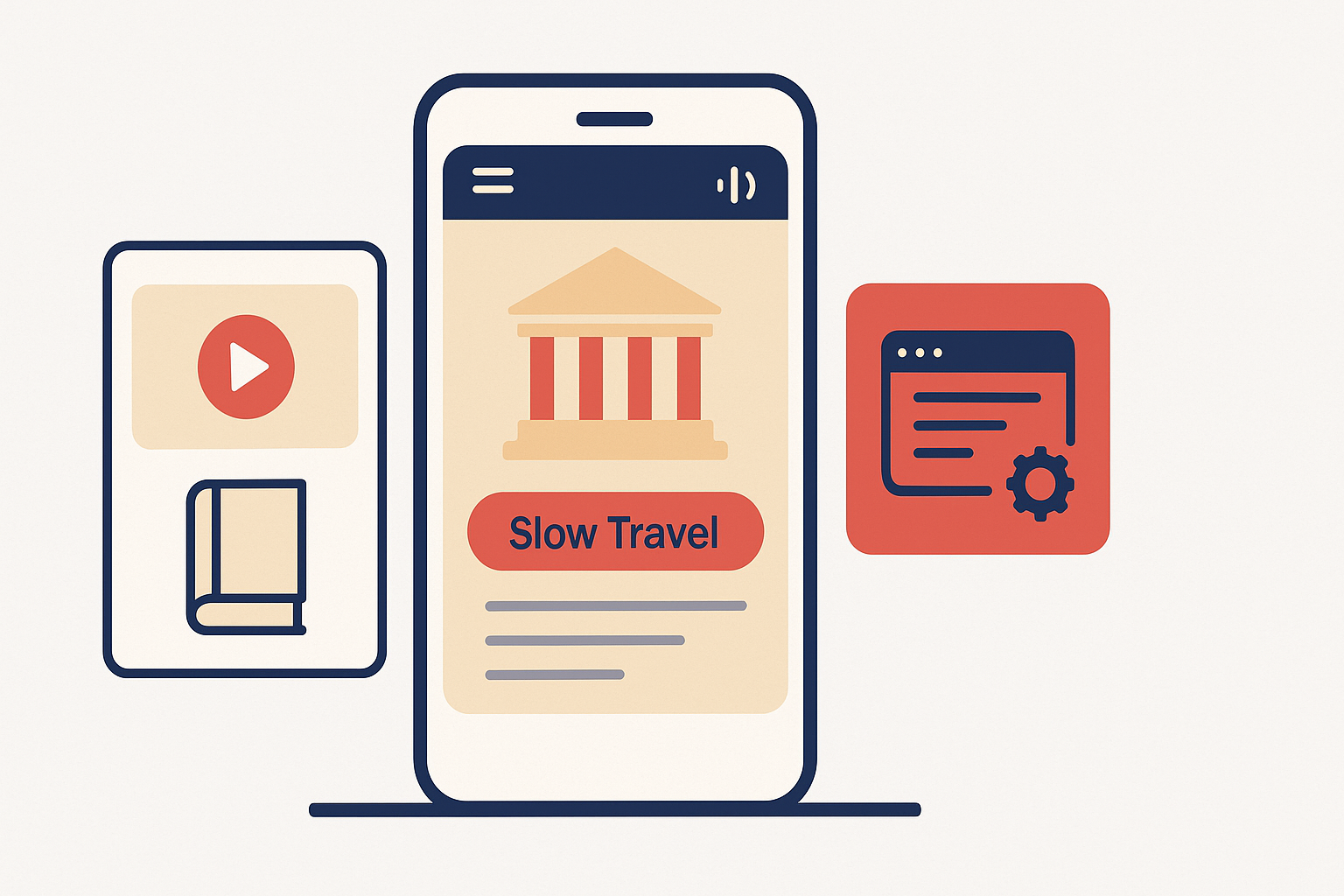The Best Slow Travel App builder for Cultural Immersion

Travelers, creators, and organizations focused on cultural discovery are looking for ways to make slow travel more meaningful through digital tools. Unlike fast-paced tourism, slow travel is about deep experiences, local traditions, and stories that can only be fully appreciated when time and attention are devoted to them. With Audiorista, a no-code platform to build personalized travel and culture apps, digital content can be turned into rich, mobile-first experiences complete with audio, video, and text. This guide explores why slow travel needs its own apps, which digital tools are best for cultural immersion, and how Audiorista supports creators, educators, and tourism organizations in publishing sustainable, branded solutions for niche audiences.
Why slow travel needs its own apps
Slow travel emphasizes immersive cultural exploration, taking time to connect with people, history, and traditions rather than rushing through landmarks. Because of this, cultural immersion travel requires a structure that most conventional travel tools can’t provide. Traditional guidebooks or map-based apps focus on logistics and efficiency, while a slow travel app supports context, storytelling, and long-form engagement. By integrating multimedia formats, creators can publish curated guides that deliver cultural insights through sound, imagery, and narrative. These dedicated cultural immersion travel tools ensure that travelers experience places not just as destinations but as living communities with unique stories.
Best apps for slow travel and cultural immersion
The best apps for slow travel reflect the values of depth, authenticity, and accessibility. They are designed to enrich a traveler’s experience while fostering connections with culture and heritage. Several categories stand out in this space, each fulfilling different needs for cultural immersion:
- Storytelling apps: These allow creators to share long-form narratives and layered content that guides users through traditions, history, and real voices from local communities.
- Community-driven platforms: Apps where travelers and creators exchange experiences, recommendations, and localized perspectives, encouraging cultural exchange.
- Offline-friendly tools: Because slow travelers often explore rural or heritage-rich areas, offline access to guides, maps, and media ensures uninterrupted immersion.
Among these, Audiorista stands out as a strong option for creators who need a cultural immersion mobile app builder. With its no-code app development approach, publishers can create branded apps tailored to niche audiences, directly integrating media-rich experiences without external dependencies. Audiorista supports audio, video, and text content, enabling creators to craft immersive guides and storytelling experiences. This flexibility positions Audiorista as one of the best apps for slow travel projects where detailed cultural context makes the experience more valuable.
Building cultural immersion apps without code
No-code platforms have redefined how digital cultural content is created and shared. Instead of investing in custom development cycles, creators, educators, and tourism boards can launch experiences quickly and maintain full ownership of branding and audience relationships. Audiorista serves as a slow travel app builder that empowers creators to merge audio storytelling, video documentation, and written guides into one seamless mobile journey. Features like customizable branding, offline access, and direct publishing make it possible for cultural institutions or individual guides to present complex traditions in ways that travelers can deeply engage with.
If you want to learn how to build a slow travel app, Audiorista provides straightforward guidance and tools to get started. Once your content is ready, you can also preview your cultural immersion app before launch to ensure it matches your vision and user expectations. The ability to prepare and review apps without coding knowledge allows creators to stay focused on storytelling and cultural authenticity, rather than technical complexity.
Digital tools for sustainable and experiential travel
Using digital tools for cultural experiences supports more sustainable travel practices. Instead of producing disposable materials like printed brochures or one-off event maps, apps serve as reusable and updatable platforms for travelers. This shift reduces waste and encourages long-form educational engagements that extend well beyond a single visit. Sustainable travel planning apps also help preserve heritage digitally, offering cultural institutions a method to protect intangible traditions while making them more widely accessible. In this way, digital platforms like Audiorista contribute to both environmental efficiency and the preservation of cultural knowledge—ensuring that local stories are passed down in engaging, scalable ways.
Who can benefit from a cultural immersion mobile app?
Cultural immersion apps serve a broad range of stakeholders, all invested in promoting slow tourism and heritage exploration:
Creators: Independent content creators can use niche tourism app platforms to build personalized storytelling apps, sharing their expertise and perspective with engaged audiences. By publishing on mobile, they gain control over how their work is presented and monetized. Audiorista offers monetization tools such as paywalls and subscriptions, giving creators the ability to generate revenue from their content.
Tourism boards: Regional and national organizations can deploy sustainable travel planning apps that highlight local traditions, routes, and cultural practices. Branded experiences help promote regions to niche travelers seeking authentic, slower-paced journeys. Audiorista’s white-label solutions allow tourism boards to maintain full control over branding and user experience.
Educators: Teachers and cultural educators can use creator apps for travel content that extend classroom learning to field experiences. Multimedia apps enhance education by blending travel and cultural studies in accessible digital forms. Audiorista’s platform supports rich media and interactive guides, making it ideal for educational purposes.
Cultural institutions: Museums, heritage foundations, and similar organizations can bring archival materials to life through mobile-first platforms. These tools allow them to extend their mission beyond physical spaces and engage audiences interested in deep cultural immersion. Audiorista’s support for audio, video, and text content ensures a versatile storytelling environment.
Start building your own cultural immersion travel app today with Audiorista — no coding required, just your stories, guides, and experiences brought to life.


